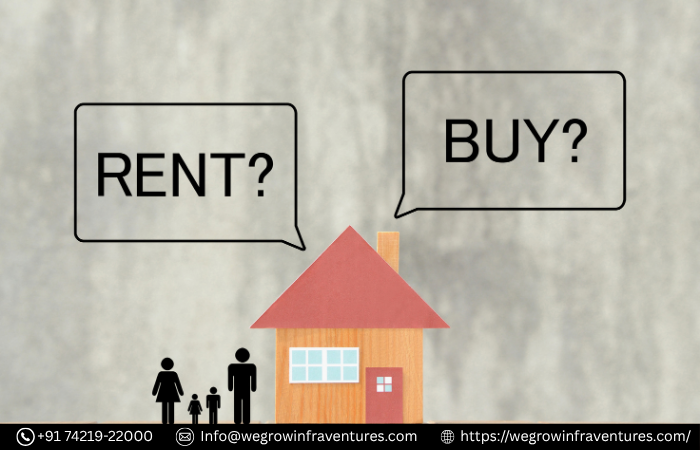Buying vs. Renting a House: What's Better for Whom?

The buying vs. renting debate has become one of the most common financial planning discussions among Indians today. Both paths offer unique benefits, but the right choice depends on life stage, income stability, long-term plans, and the real estate market dynamics in your city. In this detailed guide, we simplify when to buy a house vs rent based on practical scenarios, real-world financial logic, and lifestyle priorities. If you are trying to decide whether to commit to a home loan or continue renting, this article will help you evaluate renting vs. buying in India smartly and with clarity.
What Determines the Choice Between Buying vs. Renting?
When weighing buying vs renting a home, several aspects influence the decision:
- Financial Readiness: Buying a home requires a substantial down payment, usually between 10-25% of the property value, along with registration fees and ongoing mortgage EMIs. Renters typically pay a security deposit and monthly rent, making renting more accessible for those with limited upfront capital.
- Long-Term Plans: Those planning to stay in the same city for more than five years often benefit from buying because they can build equity over time. On the other hand, renters enjoy more flexibility to relocate for work or personal reasons without the burden of selling property.
- Lifestyle Preferences: Owning a home offers personalization and stability. Renters may prioritize convenience, location, and lower responsibility for maintenance.
- Market Considerations: Property prices and rental rates vary by location and economic conditions. Analyzing local market trends is crucial in deciding whether to buy or rent.
Advantages of Buying a Home
- Asset Building and Wealth Creation: Monthly mortgage payments build your equity and can lead to significant wealth accumulation as properties tend to appreciate over the long term. Homeownership can also act as a hedge against inflation.
- Stability and Control: Buying a property grants you the freedom to personalize your living space without landlord restrictions or sudden eviction fears. It provides long-term security, especially important for families.
- Tax Benefits: Homeowners in India enjoy tax deductions under sections 80C and 24(b) for principal repayment and interest paid on home loans, which can reduce tax liability substantially.
- Potential Rental Income: If you choose to move later, your property can generate rental income, turning your home into an investment asset.
Disadvantages of Buying a Home
- High Initial Costs: Buying involves substantial upfront expenses including down payment, stamp duty, registration, and legal fees.
- Maintenance Responsibility: Homeowners bear the full cost and effort of property upkeep, repairs, and renovations, which can be time-consuming and expensive.
- Reduced Mobility: Owning a home can limit your ability to relocate quickly for job opportunities or personal reasons due to the complexities of selling property.
- Market Risks: Property values are subject to market fluctuations. Economic downturns may impact appreciation or cause losses.
Advantages of Renting a Home
- Lower Initial Investment: Renting requires a security deposit and monthly rent, making it more affordable upfront compared to the significant costs of buying a home.
- Flexibility: Renters can easily change locations, making renting ideal for those in transient jobs, students, or those unsure about long-term plans.
- Maintenance Freedoms: Major repairs and upkeep are typically the landlord’s responsibility, reducing hassles and expenses for renters.
- Access to Prime Locations: Renting often enables living in premium neighborhoods or city centers that might be unaffordable to buy.
Disadvantages of Renting a Home
- No Equity or Wealth Building: Monthly rent payments do not contribute to ownership or asset accumulation, resulting in no long-term financial benefits.
- Vulnerability to Rent Hikes and Lease Terminations: Renters face uncertainty regarding renewal terms and rent increases that can affect budgeting.
- Limited Personalization: Rental agreements typically limit alterations and personalization of the living space.
- Lack of Tax Benefits: Renters do not qualify for the tax advantages available to homeowners.
Also Read: Best Place to Live in Gurgaon: Schools, Amenities, and Lifestyle in Gurugram’s Residential Areas
When to Buy a House vs. Rent a House?
Deciding when to buy versus rent depends on your specific circumstances:
Buy if:
- You have financial stability with enough savings for a down payment and contingency funds.
- You plan to stay in the same area for at least five years to recoup purchase costs and benefit from appreciation.
- You prioritize building equity and long-term financial security.
- Stability, customization, and homeownership are important lifestyle factors.
Rent if:
- You anticipate relocating for work, studies, or personal reasons within a few years.
- You prefer less financial burden upfront and want to avoid maintenance responsibilities.
- Your current financial situation does not comfortably support a home purchase.
- You want flexibility to experience different neighbourhoods or cities.
Renting vs Buying: Pros and Cons Table
| Criteria | Buying a Home | Renting a Home |
|---|---|---|
| Upfront Cost | High down payment and registration cost | Low security deposit |
| Flexibility | Low; tied to one location | High mobility |
| Monthly Outflow | EMI commitments | Rent payments |
| Financial Benefit | Asset creation and appreciation | No asset creation |
| Customization | Full freedom | Limited or no alterations |
| Repairs & Maintenance | Owner responsible | Landlord responsibility in most cases |
| Emotional Value | Permanent home ownership | Temporary living, less emotional attachment |
The Indian real estate market has cultural nuances influencing the renting vs buying decision. Government initiatives like Pradhan Mantri Awas Yojana promote affordable housing ownership. The rise of remote work is making flexible living arrangements more appealing, increasing renting popularity. Additionally, some prefer renting to invest savings in diversified financial assets rather than real estate.
If you are exploring property ownership opportunities, WEGROW INFRAVENTURES offers curated plots, gated community developments, and growth-focused real estate solutions.
Also Read: M3M St Andrews Sector 113 : A New Benchmark in Luxury Living
Conclusion
The choice between renting and buying a home is deeply personal and situational. Owning a home offers stability, wealth building, and tax benefits suited for those ready for long-term commitment and financial responsibility. Renting provides flexibility, lower upfront costs, and convenience favored by those in transitional life phases or valuing mobility.
Evaluate your finances, long-term plans, and lifestyle priorities carefully to determine the best fit. Whether you rent or buy, making an informed decision will help you achieve your housing and financial goals confidently.
Frequently Asked Questions
- Is buying always better than renting?
- How long should I plan to stay to justify buying?
- What are the main tax benefits of buying a home in India?
- Can renting be better financially?
- What costs should I consider when buying a home?
Not always. Buying benefits those seeking long-term investment and stability, while renting suits those needing flexibility and less financial burden.
Typically 5-7 years to recover purchase costs and gain equity benefits.
Deductions on principal repayment under Section 80C and interest payment under Section 24(b) of the Income Tax Act.
Yes, if you invest the difference in rent versus mortgage wisely or expect frequent relocations.
Down payment, legal fees, stamp duty, registration, home loan interest, property tax, maintenance, and renovation costs.




